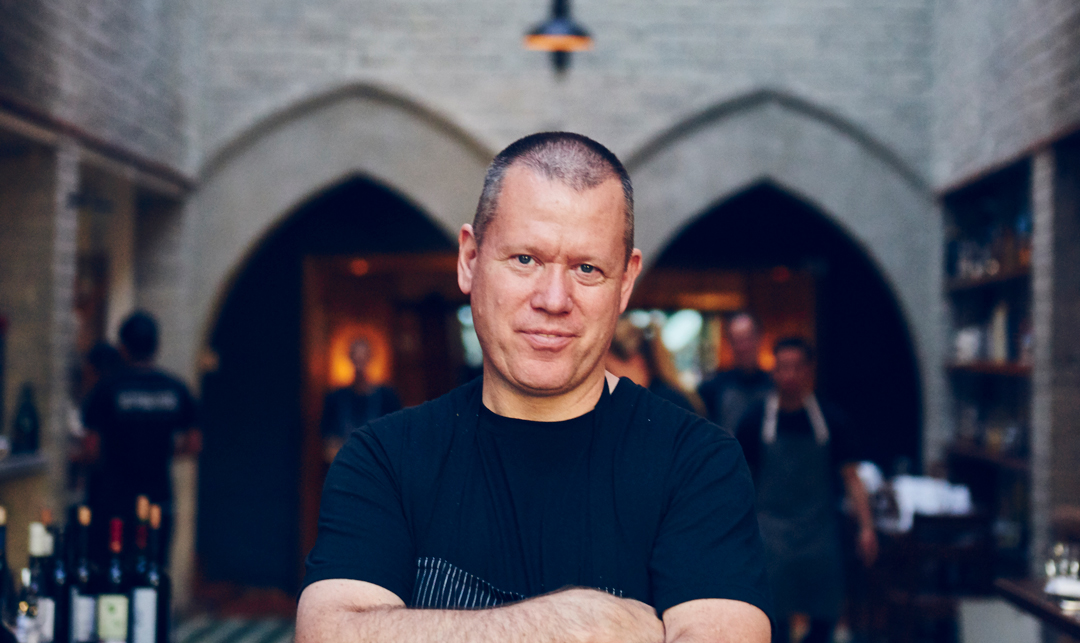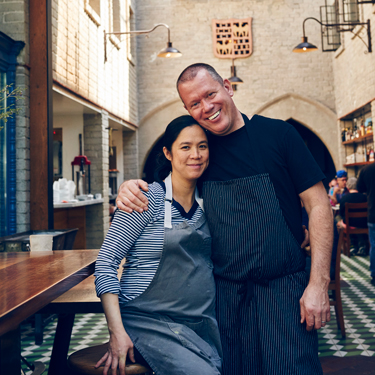It’s immediately evident to those who have dined in his current restaurants or eaten out of the kitchens in which he once cooked, that Walter Manzke is different. Whether it’s the old-school hip hop he has had piped into his dining rooms or the old-school respect he gives every ingredient in his kitchen (the same level of respect a three Michelin-star chef gives that ingredient, he would have you know) – Manzke is different and it’s great.
Manzke grew up in San Diego, California, the son of a mechanical engineer and a housewife. Discussing his early memories of food, he speaks of family dinners: “Practically every night of my life we had a salad with lettuce grown in our garden. We would always eat something from our fruit trees. It had an impact on me … the recognition of quality food that was sustainable.” As many do, he took a job at a restaurant in high school for extra spending money and quickly identified the shared thrills and joys of a restaurant and of team sports, right down to the adrenaline rush and camaraderie. The thrill was enough. He would study restaurant management at Mesa College in San Diego.
There and Back Again
Upon graduation, Manzke took a job at a restaurant within a hotel in La Jolla, California before spending nearly two decades on a culinary path that saw him cooking alongside Ferran Adria, Alain Ducasse, Thomas Keller, and Joachim Splichal.
His first stop, thanks to an introduction from Octavia Becerra, was at Joachim Splichal’s Pinot Bistro in 1993. Manzke then lent his knife skills to a kitchen in Germany before cooking with Claude Fabre at Leonce in Florensac, ultimately making the jump to Alain Ducasse’s three Michelin-star Le Louis XV in Monaco.
Though cooking within an Alain Ducasse kitchen is a once-in-a-lifetime opportunity, growing up in the kitchen with Joachim Splichal afforded Manzke several more “write home to Mom” moments. He would spend a couple weeks cooking at Thomas Keller’s The French Laundry in Yountville, California as well as at El Bulli, Ferran Adria’s now closed restaurant nestled in Spain’s Costa Brava, thought by many to be the best restaurant the world will ever see.
When looking back on his stint at El Bulli and the lessons he gleaned from Ferran, Manzke says fondly, “I think a lot of Ferran’s ideas and his way of thinking are as important, or more important, than some of the dishes he created … the ideas and recipes that the world talked about came directly from him.”
Though an unrelated thought at the time, Manzke would go on to explain Ferran’s endeavor in a manner that – in the end – I felt paralleled Manzke’s long and winding road to where he is now. “He was – a guy in a village on the Costa Brava – in the middle of nowhere – with everything in the world going against him but he pushed and pushed to create El Bulli, which became one of the greatest, if not the greatest, culinary creation ever executed,” he says.
“I think a lot of Ferran’s ideas and his way of thinking are as important, or more important, than some of the dishes he created … the ideas and recipes that the world talked about came directly from him.”
On the Shoulders of Giants
It would be more than a decade after he exited the El Bulli kitchen before Manzke and his wife and business partner Margarita (whom he met during his first stint at Patina in 1998) would have a place of their own. He would return to Los Angeles, cooking at Patina, before moving to Carmel with Margarita to open properties for David Fink – the most notable being Aubergine at the L’Auberge hotel, which the couple would run for several years.
Upon his next – and final – return to LA, Manzke and Margarita felt they had been gone for too long and needed to reestablish themselves. Manzke and Joe Pytka reopened Bastide (which had closed a couple years earlier when Ludo Lefebvre departed) before Manzke took a job cooking at Church & State, an unknown commodity in what was then known as the Industrial District, east of Downtown.
Over the next few years, Manzke hit a groove at Church & State and otherwise. He began making week-long trips monthly to Chicago for Rich Melman of Lettuce Entertain You. Most important, he came upon investors and began looking for space near Church & State to open his and Margarita’s own restaurant.
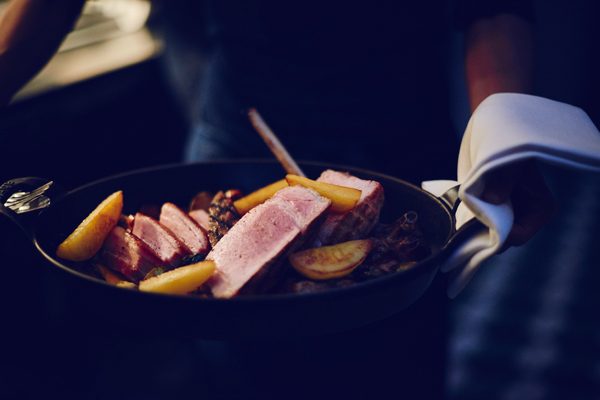
Cook Ranch Pork Belly & Chop, Asian Pear, Brussels Sprouts, Anson Mills Polenta
As fate would have it, he would open in a far more relevant space quite a ways west of the now trendy Arts District. Introduced by Melman to Bill Chait, Manzke accompanied Chait and the late Larry Silverton (Nancy Silverton’s father) on a site visit at Chait’s request. When their time together ended, Manzke confidently said goodbye to Silverton, adding “… if you ever wanna talk about Campanile let me know.”
While the rest could be seen as history, it’s much more than that. The gist – Larry Silverton called Manzke a week or so later, Manzke called Chait (whom he felt belonged in the deal), and details of a lease were under discussion.
Over the next few months, République would come to life while, simultaneously, Manzke would refurbish the nearby Playa space, turning it into a bar and taco shop in the cover of darkness – ultimately named Petty Cash Taqueria. The two restaurants, just over a mile apart, have helped to define
Manzke and Los Angeles’ dining dynamic since opening.
It is at République, within the very walls where Nancy Silverton grew in stature and in success, Manzke came into his own. Whether or not they have dined at République, Angelenos of a certain age are likely to have an opinion of the space it occupies. The building was purportedly built in 1928 by Charlie Chaplin as office space. Eventually purchased in 1988 by Larry Silverton, it would come to house Silverton’s Campanile until October 2012.
“I have such a profound respect for the building and I know how important it is … the space is so special … people want to be here. Nothing else I know of has the energy of this space. We are blessed to be here.”
Having cooked for the majority of his career (nearly 30 years now) in Los Angeles, the significance of the space he calls home is not lost on Manzke. He mentions the cultural impact of food in Los Angeles and what it means to him and his wife, whose baked goods bring the space to life early in the morning and help shut it down late at night.
“République has something I had never experienced prior in my career, the building,” he proclaims, pausing for effect to add, “I have such a profound respect for the building and I know how important it is. I am in a place, while the food and service matter, the space is so special … people want to be here. Nothing else I know of has the energy of this space. We are blessed to be here.”
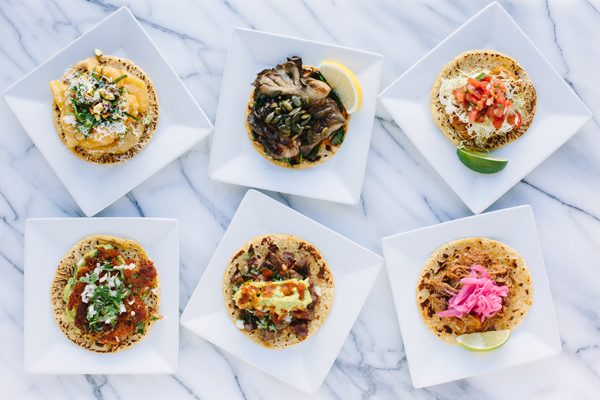
A sampling of taco offerings at Petty Cash, “a semi-authentic” taqueria
Success on Two Fronts
While Manzke has left his mark here in Los Angeles, he and Margarita have made an equally impressive imprint on another global capital – Manila. Born out of a rather impromptu decision made with Manzke’s sister-in-law and one of his former sous chefs, the couple now own and operate nine restaurants in the capital of The Philippines – with three more on the way.
As the Larry Silverton talks and early stages of République were coming together, the Manzke’s set out to open their first Manila restaurant – Wildflour. “We were opening in what was then just a neighborhood called Global City which, today, is a real city … with hundreds of high rises,” he says.
Though most thought they would surely fail, Wildflour was a success and five years later, the Manzke’s have five Wildflour locations to go along with The Pharmacy – a play on drug store soda fountains where they sell gelato and ice cream – and a trio of Pink’s Hot Dogs they franchised directly from Richard Pink himself. It’s Pink’s that Manzke seems particularly excited about, considering two of them are in Okada Manila (a $4B casino owned and operated by billionaire Kazuo Okada).
Keeping Busy Back Home
Though invested in two markets – literally – halfway around the world from one another, République certainly has Manzke’s attention.He’s introspective when discussing the restaurant, stopping to praise the success they have had thus far working untraditionally. Serving from breakfast through dinner – attracting two clientele to, essentially, two concepts is something he feels lucky to be able to do. He works hard, without question, but so too does his team – who he thanks, acknowledging how much they’ve grown.
Outside of the République brick, he and Margarita have announced their next local venture – a Filipino restaurant at Grand Central Market. Titled Sari Sari Store, the restaurant will pay homage to the variety that “Sari Sari” encompasses in Filipino.
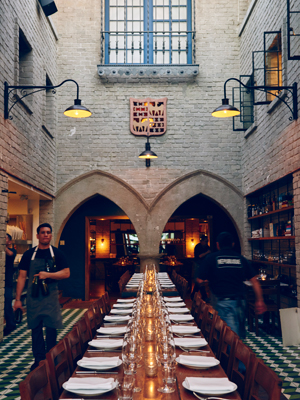
Manzke’s République, an
architectural marvel, sits within a 90-year-old building
Sari Sari Store will make three locations across Los Angeles so he and Margarita’s passion can be enjoyed locally, not to mention the nine sprinkled across Manila. As our time wound down, we refocused our line of discussion on his seminal achievement – République. It is in these waning moments that Manzke’s humility shines brightest.
Of what is he most proud? His wife – noting that she has cooked in the kitchens of Spago, Patina, and Melisse. Is he successful? Not entirely, but he is proud of the progress he and his team have made, getting better every day.
He feels there is always room to grow and that things can always get better. If he’s referring to his food, I doubt I am the only one excited for the “better” that comes next.
Photos: Marianna Jamadi and Sierra Prescott; courtesy of Sprout LA






































